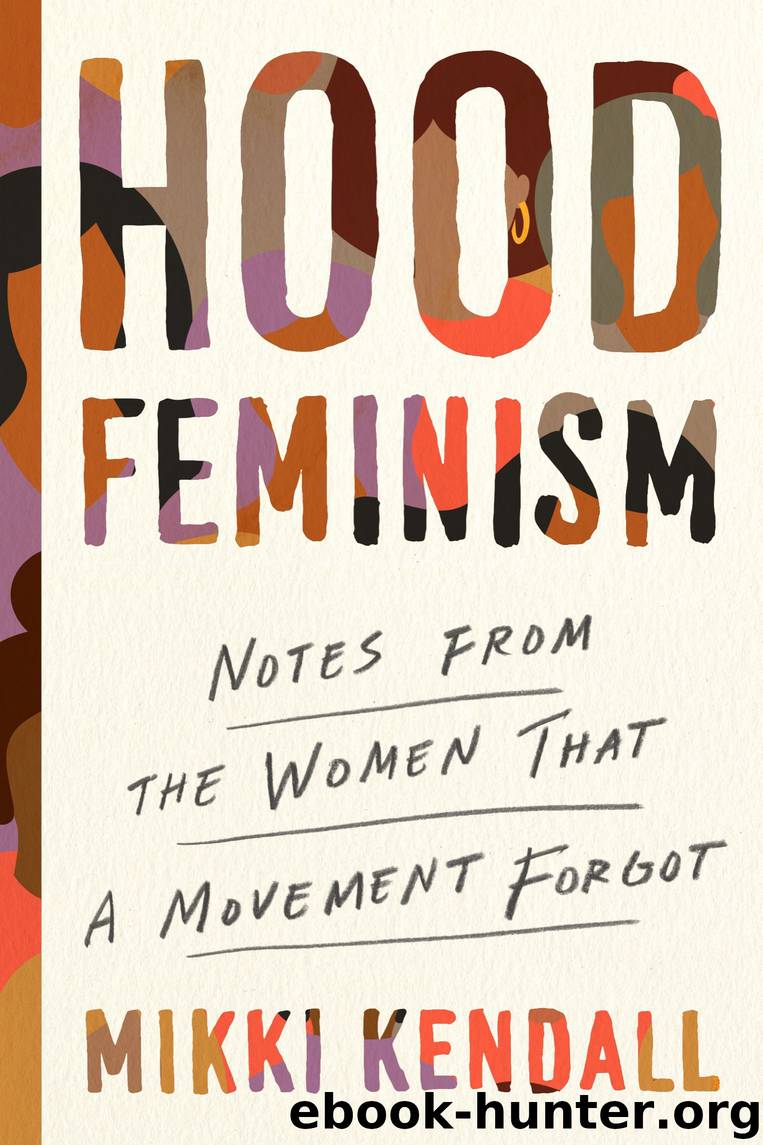Hood Feminism by Mikki Kendall

Author:Mikki Kendall
Language: eng
Format: epub
Publisher: Penguin Publishing Group
Published: 2020-02-24T16:00:00+00:00
THE HOOD DOESN’T HATE SMART PEOPLE
I have what my mother calls euphemistically a rebellious spirit. It’s a nice way to describe a child who is not what you expected. This does not mean that I was always strong, always sure, or anything even remotely close to the narratives of inborn self-confidence often foisted on young Black bodies to excuse the premature expectations of adulthood. I was a cowardly child who (a) hated fighting—literally cried through a fight because I hated fighting; and (b) threw my whole self into the fight anyway. I wasn’t a good fighter. I was just a child who understood that not wanting to fight is meaningless sometimes. There is a lot of research around young women of color and fighting, a narrative that lends itself to the idea that they are violent for the sake of violence. It ignores the fact that they are often the only people with an investment in their own safety outside their nearest and dearest.
I wasn’t a cool kid. I was a nerd; my nickname was Books. And yes, I got teased for talking so proper and reading so much. But it wasn’t the “Black people don’t value education” trope that gets trotted out so often. There were lots of smart kids at my grammar school, Charles S. Kozminski. We were all poor, so there was relatively little difference in our clothes in terms of price. Style was the key, and I had none. None. I was two years younger than everyone else in my grade, and my grandmother’s sense of style was age appropriate but not grade appropriate. She bought me the kind of clothes you dress little girls in that are prissy images of girlhood. Lace tights, Mary Janes, and full skirts, while everyone else was in overalls and gym shoes. I stuck out and not in a good way. It didn’t help that I sounded like I was reading from a dictionary half the time. Fortunately, I had friends who understood the social perils of being raised by a grandparent; they nudged me to hang out, to talk like the other kids did when the adults weren’t listening. I learned to code-switch sometime between seventh grade and twelfth grade. But I was always a nerd.
There’s a trend in some of these feminist books to tell you that the hood punishes you for being smart, that it hates those who reach for success. That wasn’t my experience at all. The same kids who called me Books are now adults who pass my articles around and tell me how proud of me they are, because there was nothing malicious in the teasing. I teased, I was teased; that’s basically the nature of kids. There’s a myth of exceptionalism attached to people who succeed academically after a childhood in poverty. We must be unique and thus worth listening to, but at the price of leaving behind the past and the people in it. You’re supposed to look back on those years
Download
This site does not store any files on its server. We only index and link to content provided by other sites. Please contact the content providers to delete copyright contents if any and email us, we'll remove relevant links or contents immediately.
| General | Discrimination & Racism |
Nudge - Improving Decisions about Health, Wealth, and Happiness by Thaler Sunstein(7709)
The Fire Next Time by James Baldwin(5449)
iGen by Jean M. Twenge(5417)
Adulting by Kelly Williams Brown(4576)
The Sports Rules Book by Human Kinetics(4389)
The Hacking of the American Mind by Robert H. Lustig(4384)
The Ethical Slut by Janet W. Hardy(4258)
Captivate by Vanessa Van Edwards(3841)
Mummy Knew by Lisa James(3693)
In a Sunburned Country by Bill Bryson(3544)
The Worm at the Core by Sheldon Solomon(3487)
Ants Among Elephants by Sujatha Gidla(3467)
The 48 laws of power by Robert Greene & Joost Elffers(3293)
Suicide: A Study in Sociology by Emile Durkheim(3024)
The Slow Fix: Solve Problems, Work Smarter, and Live Better In a World Addicted to Speed by Carl Honore(3010)
The Tipping Point by Malcolm Gladwell(2927)
Humans of New York by Brandon Stanton(2873)
Get What's Yours for Medicare: Maximize Your Coverage, Minimize Your Costs by Philip Moeller(2746)
Handbook of Forensic Sociology and Psychology by Stephen J. Morewitz & Mark L. Goldstein(2705)
